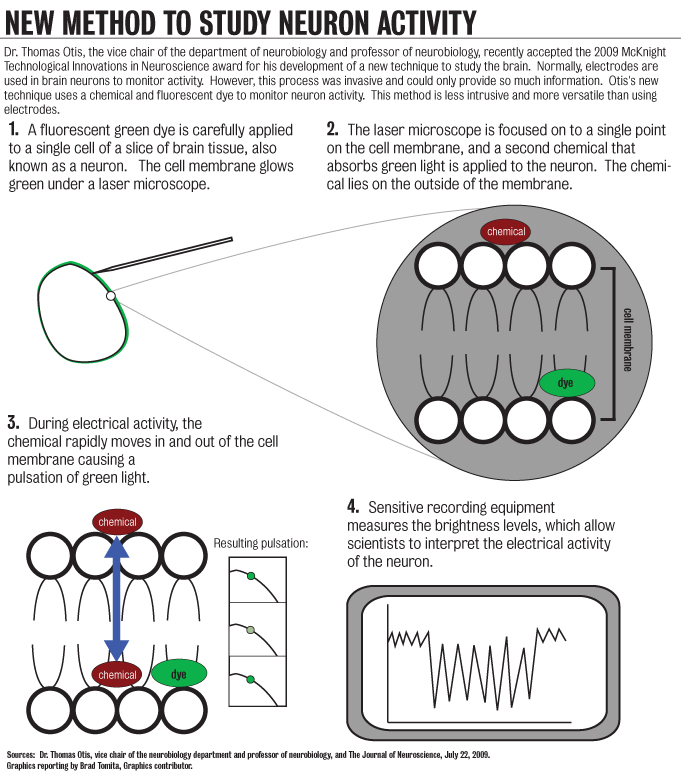There are at least some UCLA researchers who believe that religion is not a topic inviolable by science.
Sam Harris, author of “The End of Faith” and “Letter to a Christian Nation,” said that people are misled when told that science and religion are overarching categories of thought with no overlap.
“People value consistency and coherence, but when the talk turns to religion, the tone changes. All of a sudden, there’s this notion that evidence is no longer important, that evidence is corrupting of the whole enterprise,” he said.
Harris is also a researcher at the UCLA Staglin Center for Cognitive Neuroscience, and he recently published a study on differences in the mind between committed Christians and nonbelievers.
To a large extent, he found that the differences were few.
The paper, “The Neural Correlates of Religious and Nonreligious Belief,” describes the functional magnetic resonance imaging used to measure signal changes in the brains of 15 Christians and 15 nonbelievers.
The researchers found that both groups engaged the same areas of the brain to gauge the truth of a statement, whether that statement was about Elvis or about the divine origin of the Bible.
However, according to the study, questions of religion in both groups stimulate areas of the brain associated with emotion and self-representation, while irreligious questions activated more memory-related processes.
“It seems that believers and nonbelievers are virtually indistinguishable in terms of how they believe things about the world and how they think about religion. They just happen to believe different things,” Harris said.
Jonathan Gibo, a third-year biochemistry student, said that he did not find the results of the study surprising, and that as a Christian he was also not troubled by the study.
He said that he believed the pursuit of truth was paramount in both science and religion.
“I’m a science major, and I’m a Christian, but I don’t think those two spheres of my life are separate from one another. I don’t think it’s necessary to drive a wedge between the two,” Gibo said.
Though Harris is better known for his more controversial books, he does not believe that it interferes with this work as a neuroscientist and actually fosters his interest in the subject.
“You can study a phenomenon without approving of it, and you can do so quite objectively. You can study racism in a totally objective way and never for a moment endorse racism,” he said.
Marco Iacoboni, professor of psychiatry and biobehavioral sciences at the David Geffen School of Medicine, also worked on the project. He grew up in Italy, surrounded by images of the Catholic Church, and he said that images may play a big part in shaping the mind and result in attachment to a particular religion.
In his book, “Mirroring People”, he describes another reason for the perseverance of religion: the phenomenon of mirror neurons which were first described in monkeys.
Researchers found that mirror neurons fire when a monkey engages in a particular action but also fire when the monkey sees another engaging in the same action. This pathway also exists in humans.
Iacoboni says that mirror neurons may have a function in empathy, and directly enhance the function of religion. Since rites and rituals are a big part of most religions, engaging in these actions with a larger community may stimulate these mirror neurons and encourage a sense of empathy among members of that group, Iacoboni said.
However, Iacoboni said there are some complications with the neuroimaging study on Christians and nonbelievers.
It was technically inconclusive, since the researchers found no differences between the two groups. In science, differences are more important than similarities because one counter-example could prove the hypothesis to be false.
Also, Iacoboni said that religion is a complicated topic that is better analyzed when broken down into its smaller and more essential parts. In this case, the researchers chose the topic of belief because they considered it to be an inherent part of religion, but also important in general processing.
Harris explained that belief is in some ways more important than reality because it is not possible for people to know for certain that everything they are told is true.
“A bomb goes off in New York and kills a thousand people. It’s just language, but as soon as you decide it to be true, it influences your behavior,” he said. “The totality of our knowledge about the world, is characterized by what we think is true. There’s nothing but language that came to you that captured your sense of what was going to happen.”
Harris is on a quest to describe religion in increasingly precise language.
“There are truths that religion is trying to capture,” he said.”But religion is now hostage to the language and beliefs of Iron Age people who didn’t have a clue how the world works.”
